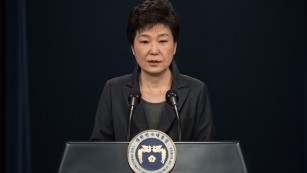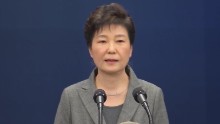Impeachment vote looms for South Korean President
Embattled South Korean President Park Geun-hye faces an ultimatum from her own party: Announce a timeline for her resignation or face possible impeachment.
Park, who's been dogged by a classified information scandal involving a longtime friend, said earlier this week she would resign if that's what the National Assembly wants.
Many observers see stepping down as a way for Park to avoid the embarrassment of impeachment as opposition parties look to press ahead next week with a vote to unseat her.
Park stopped short of specifying a date for her resignation, leading some breakaway members of her Saenuri Party to ask her to set a timeline for her departure. Mainstream members of her party have stipulated that she must stand down by April 30, with a proposed presidential election in June. Her five-year term is set to end in February 2018.
Corruption scandal paralyzes presidency
The leader has apologized three times over the affair, which started when CNN South Korean affiliate JTBC found evidence that Park confidante Choi Soon-sil had received secret documents on an abandoned tablet device.
Choi, who does not hold an official government position, is accused of using her relationship with Park to accumulate millions of dollars in donations to her foundations. Choi is charged with abuse of power, fraud and coercion, and two of Park's former aides also face criminal charges.
Park does not face the threat of charges because the South Korean Constitution gives immunity to the sitting President.
Prosecutors have said they want to speak to Park after naming her as a suspect in the corruption probe. Her attorneys have said she is willing to cooperate, but she said this week she was too busy to meet with prosecutors.
Protesters march for ouster
On Saturday, tens of thousands of protesters again took to the streets of Seoul to push for Park's ouster.
A candlelight protest held on the main boulevard facing the presidential offices and residence -- known as the Blue House -- follows weekly mass demonstrations in the capital and other cities since late October.
Since the corruption scandal broke, a survey by Gallup Korea showed Park's approval ratings dipped into single digits, making her one of South Korea's least popular leaders since the country became a democracy in the 1980s.
The ultimatum: Resignation or impeachment
South Korea's opposition parties said they would vote Friday on a motion to impeach Park.
With the impeachment vote looming, breakaway members of the ruling Saenuri Party are instead pushing for Park to announce a timeline to resign by 6 p.m. local time Wednesday, arguing that impeachment then would be unnecessary.
The nonloyalist members of the Saenuri Party members have vowed that if Park does not confirm her resignation date by that deadline they will vote for impeachment two days later. The three opposition parties have a combined total of 165 out of the 300 legislative seats. A two-thirds majority of 200 votes is required to pass the impeachment motion, so members of Park's party will be needed to help pass it.

President Park Geun-hye apologizes during an address last month.
If successful, the motion would then pass to the constitutional court for consideration. Justices have 180 days to decide the case after it is referred to them.
In a nationally televised speech last month, Park said she deeply regretted her actions.
"I again deeply apologize for causing an immeasurable disappointment and worry," she said. "All this is my fault, caused by my negligence."
News Courtesy: www.cnn.com











